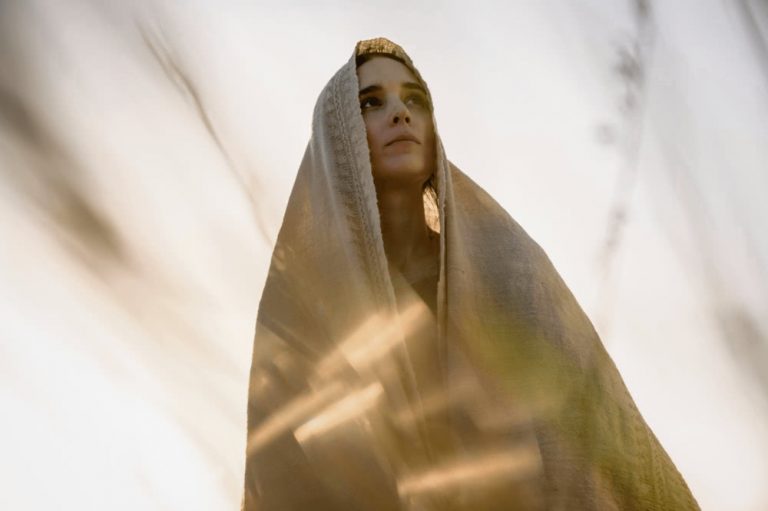Almost all of the best Christian films are about doubt. The Exorcist, The Last Temptation Of Christ, The Passion Of The Christ, Jesus Of Montreal – all of them feature divine beings and keepers of the faith beset by worries, concerns, and doubts. It’s not particularly hard to see why, either. Conflict is what drives plot, and characters of steadfast conviction aren’t much fun to watch – they’re just too moral; a gaggle of cinematic Ned Flanders-types, endlessly nattering about supernatural concerns most of us wouldn’t touch with a ten-foot barge pole. We want our Christs to be broken and tempted, not, ironically, to preach at us.
In that way, Garth Davis’ new big-budget faith picture, Mary Magdalene deserves at least some kudos points for firmly and resolutely breaking the mould. In Mary Magdalene, Jesus (Joaquin Phoenix) is steadfast; his feats of faith unquestionably real; his followers dedicated, stately philosophers who don’t stop spouting devotionals for a second. A brief text epilogue even goes so far as to treat the resurrection of Christ as an unassailable fact, coolly – almost flippantly – placing it in the historical record. So there’s no doubting Davis’ intentions: he is a believer, and he has made a film for his fellow Christians.
We want our Christs to be broken and tempted, not, ironically, to preach at us.
In the process, Davis has managed to alienate an entire audience of non-believers who will struggle through the chaste, platonic “romance” that blossoms between Christ and the titular Mary (Rooney Mara). But more than that, he has managed to leech the drama from his own film. In Mary Magdalene, God is real and the kingdom of Heaven is awaiting us all after death, so there is nothing to fear – no sense of emotional stakes. And in turn, what might well be the most famous death of all time – the crucifixion of Christ – becomes as sapped of meaning as the driving into the ground of a croquet hoop.
Opening in the Middle East, as a young Mary struggles against the strict guidance of her father and domineering brothers, the film ostensibly tells the story of Christ’s ascendency and death from the point of view his spiritual right hand-woman. But before the end of the first act Davis and his screenwriters, Helen Edmundson and Phillipa Goslett, lose sight of proceedings and abandon their wide-eyed heroine in favour of the son of God himself.
The move is both a blessing and a curse. Mara’s Magdalene, sporting an inexplicable American accent and a trembling bottom lip, is so insufferably po-faced that it’s impossible to see her as anything but a narrative device, and it proves refreshing to get some distance from her. But by abandoning both Mary and the promising hints that he’s willing to offer a feminist retelling of a typically male-dominated story, Davis dooms himself to repeating a narrative in the leaden, monotonous voice of a particularly bland Sunday school teacher.
He has made a film for his fellow Christians.
There is, at least, some joy to be gained from Davis’ cinema verite approach. His camera is fluid, gliding above the sand behind Christ, Mary and the apostles as they make their trek to the end of all ends in Golgotha, and the resurrection of Lazarus, filmed in expertly controlled close-ups, is a marvel that offers a tantalising glimpse of the film Davis might have been able to make if he had been willing to stray from the beaten path a bit. He’s got himself a bold opening shot too, as Mary sinks through an ocean as serene as a stone, and the water and dirt motif he threads throughout Mary Magdalene is more impressive than anything in his script.
Phoenix turns in a good, if workmanlike performance, though ironically, he is at his weakest when preaching. His is a Christ who reveals himself in brief glimpses and touches – a nuzzled kiss placed upon the top of the head of a revived believer; a chapped hand grasping the outstretched wrist of a beggar; a figure, all in white, sitting by a hilltop, newly brought back to life. And his crucifixion, when it comes, is supremely physical; he writhes and stretches before he ascends, a flap of skin on his ribs modelled after the same wound in Caravaggio’s Doubting Thomas open to the sand and the wind.
And yet the stand-out performer is Tahar Rahim, who brings nuance and complexity to Judas. Whereas Mara and Phoenix seem determined to take the most literal readings of their characters, Rahim plays the scripture’s fallen apostle as though he is a cult member who eventually comes to see the light and unlearn his programming, going from beaming devotee to troubled and reserved naysayer.
The film could have done more with the complexity that he brings. Instead, it is an exercise in penance-paying for Christians and a testing of the patience of all else, as dry and plain as a communion wafer.
Mary Magdalene is in Australian cinemas from Thursday March 22.


































